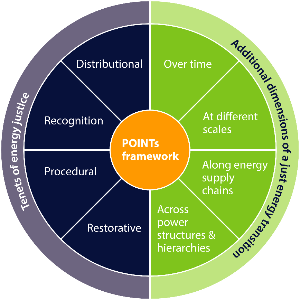Rachel Bray and Rebecca Ford
Climate change poses the biggest threat to our planet, its biodiversity and humanity as our planet gets increasingly warmer due to human-induced temperature rises. However, whilst many people globally are aware of climate change and that many things need to change, not many comprehend how transformational that change needs to be if we are to halt global temperature rise to well below 2 degrees Celsius this century. A key factor in this transformation will be placing people at the heart of policy and decision-making and our new report sets out ways in which decision-makers can ensure this happens.
Opportunities and challenges of transition to clean energy
Our own area of research, the energy sector, is a key area for action, and the transition to clean energy is one of the UK’s five priority areas for COP26. This transition has the potential to impact a wide range of stakeholders across government, industry, business, communities, workers and members of the public. Alongside the potential benefits from creating green energy jobs, the transition to net-zero brings opportunities for beneficial social, political, and economic outcomes.
However, we are also faced with an era of unprecedented social and economic inequality, which are often amplified under the socio-economic disruptions associated with transitions. Without careful planning and policy making, the potential benefits and burdens of the net-zero transition are unlikely to be fairly distributed across society, with negative impacts disproportionately affecting those in lower socio-economic and minority groups.
Delivering a socially inclusive and equitable net zero transition
Against this backdrop there has been increasing recognition for the need to deliver a socially inclusive and equitable net-zero transition. There is a moral imperative to embed justice in the energy transition and underpin international agreements. Equally important, the transition to net-zero simply won’t happen at the pace and scale commensurate with the commitments being made by national, sub-state, and non-state actors if the values, needs, perspectives, and rights of the energy workforce and wider society are not accounted for.
The Covid crisis has shown us a glimpse of the inequalities faced by communities globally, inequalities which will become greater as climate change worsens. It teaches us that those communities who have suffered worse from the crisis could ultimately be those who suffer worse from climate change. However, whilst we had no time to prepare for the Covid crisis, we have a short window of opportunity to be prepared and proactive in how we tackle the climate crisis and deliver a just energy transition.
Why energy justice is important
So why is energy justice important? For us, a large element is the moral imperative, bringing our attention to the very real human dimension of the energy transition, which can often be neglected by policies that focus primarily on cost or carbon. It’s essential that communities are resilient in the face of the massive changes to come, that disruption is minimised and managed, that people have access to a clean energy future and the economic resources they need - to not just survive, but to thrive. And this requires action – not just from those communities at the sharp end of transition – but from a diversity of stakeholders across all levels of society.
This includes national policy makers and devolved governments - ensuring legislative change and polices which enable people to make adaptive change. This includes local governments - instilling energy justice principles into strategies and planning practices. This includes industry and business - incorporating ethical standards and being accountable (no more ‘greenwashing’). This includes communities - working together to support and educate each other on the scale of transformation needed. This includes us all making those lifestyle changes necessary to cause a ripple effect – and letting those above us in the decision-making hierarchy know that this matters to us.
Decision-makers in policy, business, and community organisations can ensure justice principles are embedded into their policies and strategies – at any level of decision-making- and we have provided a framework for considering how to put people into the heart of policy and decision-making, alongside the more traditional focus on economic, climate, and environmental impact.

The Energy Justice POINTs framework and associated questions can help decision-makers explore the wide-reaching energy justice implications of their net-zero visions, strategies, and policies. This could have benefits for a wide range of stakeholders, for instance by reducing regional economic disparities through targeted provision of jobs and training initiatives. It’s therefore important to design policies not just for the current system, but proactively for the future system that reflect on the questions of who wins/loses, how, why, and when, across time, geography, supply chains, and decision-making hierarchies.
For more information, please download our report or follow up with us directly if you want to get involved in our ongoing work.
